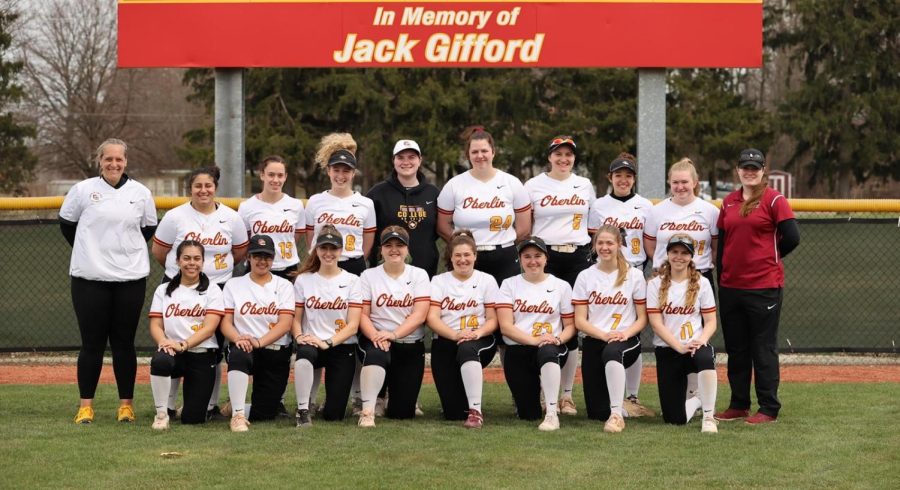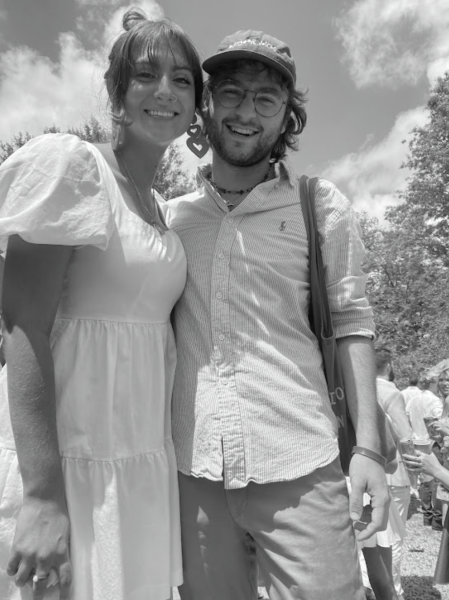Oberlin Softball Players Face Racism from Rose-Hulman
The Oberlin softball team poses for a team photo on Culhane Field at Dolcemaschio Stadium.
On April 3, during a double-header against the Rose-Hulman Institute of Technology in Terre Haute, IN, members of Oberlin’s softball team were confronted with racial slurs from the opposing team. In the wake of the incident, Oberlin will no longer play against Rose-Hulman in non-conference competitions. Still, the students who faced the racial abuse say they have felt unsupported by the College.
In the course of the double-header, fourth-year V Dagnino, third-year Lalli Lopez, and second-year Mia Brito, all athletes of color, were referred to as “monkeys” by Rose-Hulman players, who also made grunting and squeaking sounds.
Brito initially tried to brush off the abuse from the Rose-Hulman offenders, but the taunts did not stop.
“It became increasingly obvious that the racism was directed toward V and I as the [first] game went on,” she said. “The taunts stopped when V and I didn’t start the second game, but once we reentered the field, they immediately started again. I was very aware of what was going on.”
Brito, who typically plays first base, was standing only a few feet away from the dugout. She described being able to clearly see and hear the girls who were directing the hate at her.
“They made monkey noises and kept yelling, ‘Who let the monkeys out?!’ when I ran onto the field,” she said. “The players on the team made no effort to hide their racism, which I guess was the whole point. It was extremely difficult to keep my composure on the field — I had a pit in my chest and had to hold back tears while playing.”
As a person of color, Brito has always expected to face racism at some point in her life, but described the event as extremely hurtful nonetheless.
“I have always been extra aware of my skin tone while at away games, but it honestly was just shocking that this type of blatant racism is still accepted in 2022,” she said. “Obviously the racial discrimination we faced could have been worse but, for me, it opened the generational wound of racial trauma that my family has faced.”
Lopez echoed Brito’s statement, highlighting that being a POC will always come with challenges.
“Being a POC comes with an automatic target on your back from the moment you step out into the world,” they said. “You know this, but no matter how hard you try to prepare yourself for anything, it will never prepare you for actually enduring any sort of racist act.”
Dagnino, who is a catcher on the team, said that they weren’t able to fully process the experience until many days later when they called their father and explained what had happened.
“My father started crying on the phone with me,” Dagnino said. “He’s faced an extreme amount of pain and trauma in his life due to being an immigrant. He’s endured so much hate for being a Brown man here in America. He came to this country to make a better life for me and my family, and to hear that I had to go through something like this made him feel like he had failed to protect me.”
Since the incident, Dagnino has felt the sense of safety they had previously felt at Oberlin quickly dissipate, and they face daily anxiety attacks.
“Something I realized on the phone with my dad was that this kind of thing is something I might have to get used to — and that’s scary,” they said. “I don’t want to have to live the rest of my life like this, worried that I might get hate crimed or that when I’m doing something I love, like softball, that feeling of safety can just be ripped away from me.”
Like Dagnino, Lopez knows that this is something that will stick with them for the rest of their life.
“This event cuts so deep, but I’m still here,” they said. “I’ve never wanted to become stronger because of an experience like this, but it’s something that I’ll have to carry with me for the rest of my life, regardless of what I want.”
Upon returning to Oberlin, the three athletes on the softball team sought institutional support but were unable to find any through the College’s resources.
“I’m really fortunate that I have a therapist outside of Oberlin who has been able to help me work through this,” Dagnino said. “I also am in this line of work since I’m a part of [the Preventing and Responding to Sexual Misconduct program] and have close relationships with administrators in the department. If I didn’t have the privilege of knowing what to do, I don’t know where our mental headspaces would be. I called the Counseling Center a week after things went down and they said they had no availability for three weeks.”
Brito said that she ended up having to search for resources on campus on her own, a task that she felt should not have been her responsibility.
“Nothing was offered to me,” she said. “I had to do all the research on how to help myself on my own. We, being the victims, were expected to reach out on our own. That burden should not have been put on me. I am a full-time student-athlete with two jobs, yet still was expected to be the one who reaches out for support.”
Still, Delta Lodge Director of Athletics & Physical Education Natalie Winkelfoos has worked with the women’s head softball coach Sarah Schoenhoft, President Carmen Twillie Ambar, the Title IX office, and the staff at Rose-Hulman to address the racism that the three athletes experienced there.
“Coach Schoenhoft reached out to me immediately after she learned what occurred during their game — she was told after the game what the team had experienced,” Winkelfoos wrote in an email to the Review. “I reached out to the Rose-Hulman [Associate Director] Monday morning to discuss the situation and addressed it with her direct supervisor, the coach, and team.”
In addition to specific measures to address last month’s debacle, Schoenhoft also highlighted that mental health and regular team check-ins are highly important to the program’s values.
“Protecting mental health is of the utmost importance,” she wrote in an email to the Review. “As coaches we want to win, but at the end of the day, physical and emotional well-being of both players and coaches is more important than winning any game.”
As a check-in, the Oberlin softball team responds to a question every day before practice. Schoenhoft finds this helpful as a coach, because knowing how everybody is feeling before practice starts might impact how it is run.
“We also do multiple check-in meetings throughout the year to check in [about] softball and everything else,” she wrote. “Once you get to know a player well enough, you can usually tell when something is off. Depending on the severity, that might constitute a casual check-in, a more official check-in, or a [Student Health and Resource Exchange] report.”
Despite the department’s best efforts to offer support, Brito was unhappy with how the institution responded to the incident.
“As a woman of color, I felt unsupported by Oberlin as an institution,” she said. “As a POC you can expect not to be treated fairly, but I had higher expectations for Oberlin.”
Lopez is aware that there might never be a way to ensure racism won’t exist in competition, but they hope that this can be a learning experience and wake-up call for the College so that proper protocols can be put in place for the future.
“I know it’s impossible to solve global racism from Oberlin, Ohio, but I hope that Oberlin College, as an institution, can move forward and help its students of color should another thing like this happen again,” they said.
Lopez knows that this experience will stick with the players forever, but also says it’s important that it doesn’t define them.
“I don’t want mine and my friends’ legacy at this school to be that we were victims of racism,” they said. “I want people to know us for who we actually are: kind, hardworking, dedicated, and incredibly smart, among other beautiful things that make each of us great people. The color of our skin doesn’t define us as people.”




